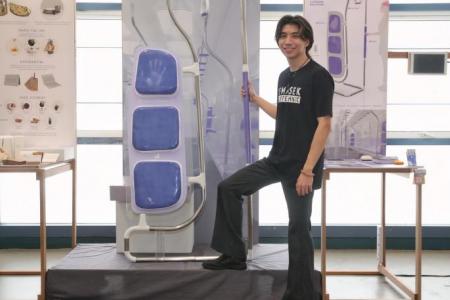Temasek Poly student comes up with material that can make viruses 'visible'
Temasek Polytechnic Project and Industrial Design student Mr Lukas Lee, 19, as part of his final-year project, wanted to create a product that would be useful in an era where Covid-19 is endemic.
With this in mind, he came up with a material he has called "Aegis", which is not only self-sanitising, but also changes colour when it has just been touched and is contaminated.
The material is made up of multiple layers, with a thermochromic coating layer that changes a layer beneath it from dark to light purple when exposed to the heat of human contact.
The surface layer is an anti-viral sheet by technology company ACLIV, which kills any microbes in the time that it takes for the colour to change back to normal.
"I was looking at interesting ways to show how hygiene can be made visual. It was mainly this question that led me to think out of the box," Mr Lee explained on Wednesday (March 30).
He plans for this material to be used on common contact areas in public transport, such as poles, handles and leaning panels, and intends to reach out to transportation companies, such as SBS transit to commercialise his product.
His project was among 391 concepts by graduating students showcased in the polytechnic's annual Design Show that spans different disciplines, including fashion and communication design.
The show is open to registered guests on Thursday and Friday - and this is the first year since the pandemic that there are no restrictions on the number of visitors.
Another project on display is Shi Bui, a line of sustainable womenswear pieces.
Each outfit is coloured with natural dyes, and the pieces are created by stitching rectangular pieces of cloth draped to the body's form so that no fabric is wasted in cut-offs.
Each clothing item is also made up of different pieces that can be styled in various ways based on an individual's preferences, so that wearers would not get bored of the outfit easily and discard it.
This is to reverse the trend of fast fashion, said Shi Bui's creator,apparel, design, and merchandising student Nay Chi Lin Lhat, 21.
"Many clothes do not last long, and they all look the same. So with this clothing line of mine I hope to bring something new to the market," she said.
"I hope to remind people in today's fast-paced society to not take things too hastily and embrace a slow quality of life."
Ms Nay's creations were among three projects that won a $1,000 prize from the school on Wednesday evening as part of its sustainability awards, given to those who address social issues including responsible consumption.
Another winner of the award was communication design student Ms Hazel Ho, 20, who came up with Leftovers, a meal-planning app that aims to help users reduce household food waste.
The app allows users to key in their leftover ingredients, and provides them with recipes based on them. Users can also upload their own recipes for others to follow.
Highlighting how households here dispose of an average of 2.5kg of food waste every week, Ms Ho said: "Food is a very precious resource for us, yet we are wasting them when they could have been consumed."
Get The New Paper on your phone with the free TNP app. Download from the Apple App Store or Google Play Store now


